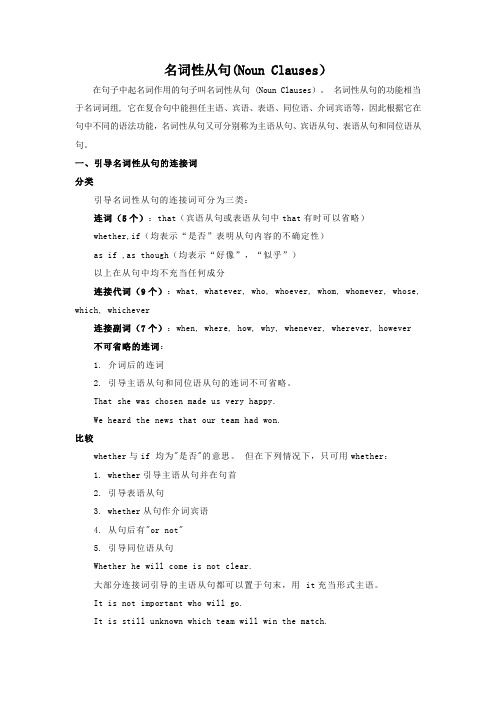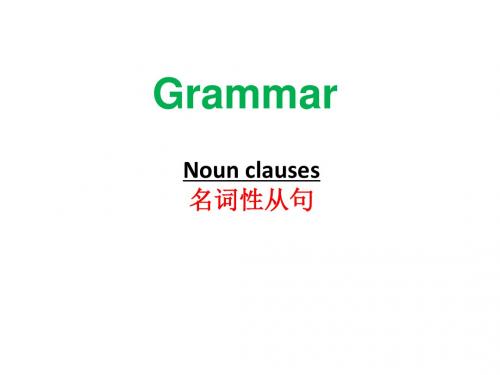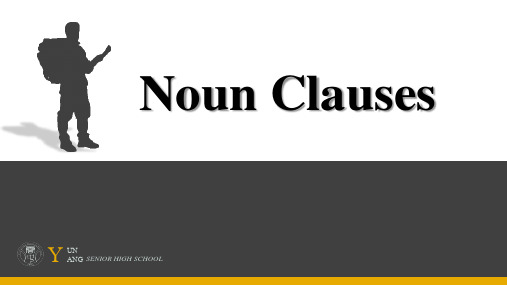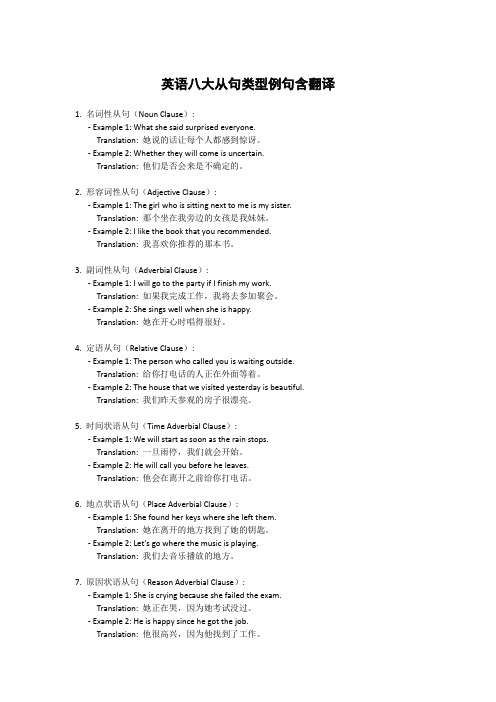Noun clause 名词性从句
- 格式:docx
- 大小:32.50 KB
- 文档页数:4

名词性从句 Noun clause(包括主语从句、宾语从句、表语从句和同位语从句)定义:A noun clause is a dependent clause that acts as a noun in a sentence. Noun clauses will contain a subject and a verb, but they cannot stand alone in a sentence. It must always be paired with a main clause.1.主语从句 subjective clause定义:A noun clause is a clause that plays the role of a noun. We use it as subject placeholder.结构:(1)主语从句(subject clause)+谓语(predicate)例句:what she said is right.(2)It 形式主语(formal subject)+谓语(predicate)+主语从句例句:It is important to arrive on time.2.宾语从句 objective clause定义:objective clause is clause that acts as an object in a sentence. It often follows a verb. 结构:{subject} + {verb} +(that可省略)+ {object clause}例句:I know (that) he is lying.I didn’t realize (that) I was late.3.表语从句 predicative clause定义:A predicative clause is a clause that follows a linking verb(系动词)and describes the subject of the sentence. It may be introduced by conjunctions such as that, whether, as, because, A predicative clause may be introduced by conjunctions(连词), such as that, whether, as, as if, because, or connectives (连接词). Connectives many be conjunctive pronouns (连接代词)(who, whom, what, whose, which, whoever, whatever) or conjunctive adverbs (连接副词) (where, wherever, when, whenever, how and why).结构:Subject+ linking verb+ predicative clause例句:The regulation was that the first examination should be done in writing.Our proposal is that you should join in.Their suggestion was that no one should interfere.注:if不能引导表语从句。

名词性从句(Noun Clauses)在句子中起名词作用的句子叫名词性从句 (Noun Clauses)。
名词性从句的功能相当于名词词组, 它在复合句中能担任主语、宾语、表语、同位语、介词宾语等,因此根据它在句中不同的语法功能,名词性从句又可分别称为主语从句、宾语从句、表语从句和同位语从句。
一、引导名词性从句的连接词分类引导名词性从句的连接词可分为三类:连词(5个):that(宾语从句或表语从句中that有时可以省略)whether,if(均表示“是否”表明从句内容的不确定性)as if ,as though(均表示“好像”,“似乎”)以上在从句中均不充当任何成分连接代词(9个):what, whatever, who, whoever, whom, whomever, whose, which, whichever连接副词(7个):when, where, how, why, whenever, wherever, however 不可省略的连词:1. 介词后的连词2. 引导主语从句和同位语从句的连词不可省略。
That she was chosen made us very happy.We heard the news that our team had won.比较whether与if 均为"是否"的意思。
但在下列情况下,只可用whether:1. whether引导主语从句并在句首2. 引导表语从句3. whether从句作介词宾语4. 从句后有"or not"5. 引导同位语从句Whether he will come is not clear.大部分连接词引导的主语从句都可以置于句末,用 it充当形式主语。
It is not important who will go.It is still unknown which team will win the match.二. 主语从句作句子主语的从句叫主语从句。



英语八大从句类型例句含翻译1. 名词性从句(Noun Clause):- Example 1: What she said surprised everyone.Translation: 她说的话让每个人都感到惊讶。
- Example 2: Whether they will come is uncertain.Translation: 他们是否会来是不确定的。
2. 形容词性从句(Adjective Clause):- Example 1: The girl who is sitting next to me is my sister.Translation: 那个坐在我旁边的女孩是我妹妹。
- Example 2: I like the book that you recommended.Translation: 我喜欢你推荐的那本书。
3. 副词性从句(Adverbial Clause):- Example 1: I will go to the party if I finish my work.Translation: 如果我完成工作,我将去参加聚会。
- Example 2: She sings well when she is happy.Translation: 她在开心时唱得很好。
4. 定语从句(Relative Clause):- Example 1: The person who called you is waiting outside.Translation: 给你打电话的人正在外面等着。
- Example 2: The house that we visited yesterday is beautiful.Translation: 我们昨天参观的房子很漂亮。
5. 时间状语从句(Time Adverbial Clause):- Example 1: We will start as soon as the rain stops.Translation: 一旦雨停,我们就会开始。

英语名词性从句Noun Clause 英语名词性从句 Noun Clause英语中的从句是一种句子结构,它包括主语从句、宾语从句、表语从句和同位语从句等。
其中,名词性从句(Noun Clause)作为一个整体可以在句子中充当名词的角色。
本文将详细介绍名词性从句的定义、分类及其在句子中的应用。
一、名词性从句的定义名词性从句是指充当名词的作用,并在句子中担任特定成分的从句结构。
它可以充当主语、宾语、表语、同位语或介词宾语等,根据在句子中充当的角色不同,名词性从句分为主语从句、宾语从句、表语从句和同位语从句。
二、主语从句主语从句在句子中作为主语出现,一般用于强调句型或感叹句型中,通常以 "that" 或 "whether/if" 引导。
例如:- That he can sing well is known to everyone.(他唱歌好是众所周知的。
)- Whether he will come to the party is still uncertain.(他是否会来参加派对还不确定。
)三、宾语从句宾语从句在句子中作为动词或介词的宾语,引导词根据宾语从句的内容和语义不同而变化。
例如:- I believe that she is innocent.(我相信她是无辜的。
)- He asked me where I was going.(他问我要去哪里。
)四、表语从句表语从句在句子中作为主语补足语,常用引导词有 "that" 和"whether/if"。
例如:- My wish is that she succeeds in her career.(我希望她在事业上能够成功。
)- The question is whether we should take immediate action.(问题是我们是否应该立即采取行动。
英语中几大从句及其句型1. 名词性从句(Noun Clauses)- 宾语从句(Object Clauses): 通常作为动词或介词的宾语。
- He wonders if she will come.- I know that you are busy.- 主语从句(Subject Clauses): 作为句子的主语。
- That she was late was obvious to everyone.- What she said surprised us all.- 表语从句(Complement Clauses): 用作句子的表语。
- The problem is that we don't have enough time.- The question is whether they will agree.- 同位语从句(Appositive Clauses): 用以解释名词的内容。
- The fact that he had not told the truth disturbed everyone.- The rumor that they were getting divorced spread quickly.2. 定语从句(Adjective Clauses)- 限制性定语从句(Restrictive Adjective Clauses): 不可省略,因为它对先行词起到限定作用。
- The book that you gave me is fascinating.- The man who arrived late was not admitted.- 非限制性定语从句(Non-restrictive Adjective Clauses): 可以省略,它提供额外信息,但不影响句意。
- My car, which is ten years old, still runs well.- The house, which I sold last year, has been renovated.3. 状语从句(Adverbial Clauses)- **时间状语从句** (Adverbial Clauses of Time): 表示时间关系。
noun (nominal) clauseDEFINITIONIn English grammar, a noun clause is a dependent clause that functions as anoun (that is, as a subject, object, orcomplement) within a sentence. Also known as a nominal clause.Two common types of noun clause in English are that-clausesand wh-clauses:•that-clause: I believe that everything happens for a reason.•wh-clause: How do I know what I think, until I see what I say? See Examples and Observations below.Also see:•Practice in Building Sentences With Noun Phrases and Noun Clauses•Anticipatory It and Dummy It•Complement Clause•Extraposition•Gerund•Infinitive•Noun Phrase•Putative Should•That-Clause•What-ClauseEXAMPLES AND OBSERVATIONS•"When Mrs. Frederick C. Little's second son arrived, everybody noticed that he was not much bigger than a mouse."(E.B. White, Stuart Little, 1945)•"What I like doing most of all in the evenings, these days, is sitting in a gormless stupor in front of the television, eatingchocolate."(Jeremy Clarkson, The World According to Clarkson. Penguin Books, 2005)•"A university is what a college becomes when the faculty loses interest in students."(John Ciardi, Saturday Review, 1966)•"I know that there are things that never have been funny, and never will be. And I know that ridicule may be a shield, but it is not a weapon."(Dorothy Parker)•"I believe that there is a subtle magnetism in Nature, which, if we unconsciously yield to it, will direct us aright."(Henry David Thoreau, "Walking")•"The thought of stars contributed to the power of his feeling. What moved him was a sense of those worlds around us, our knowledge however imperfect of their nature, our sense of their possessing some grain of our past and of our lives to come."(John Cheever, Oh What a Paradise It Seems. Random House, 1982)•"Whoever was the person behind Stonehenge was one dickens ofa motivator, I'll tell you that."(Bill Bryson, Notes From a Small Island. Doubleday, 1995) •"How we remember, what we remember, and why weremember form the most personal map of our individuality."(Christina Baldwin)•"How people knew when they were being trailed he found himself unable to imagine."(Edmund Crispin [Robert Bruce Montgomery], Holy Disorders, 1945)•"This is the story of what a Woman's patience can endure, and of what a Man's resolution can achieve."(Wilkie Collins, The Woman in White, 1859)•"I knew exactly how clouds drifted on a July afternoon, what rain tasted like, how ladybugs preened and caterpillars rippled, what it felt like to sit inside a bush.”(Bill Bryson, The Life and Times of the Thunderbolt Kid.Broadway Books, 2006)•"That dogs, low-comedy confederates of small children and ragged bachelors, should have turned into an emblem of having made it to the middle class—like the hibachi, like golf clubs and a second car—seems at the very least incongruous."(EdwardHoagland, "Dogs, and the Tug of Life")•Nominal Clauses as Direct Objects- "All sentences, then, are clauses, but not all clauses aresentences. In the following sentences, for example, the directobject slot contains a clause rather than a noun phrase. These are examples of nominal clauses (sometimes called 'noun clauses'):•I know that the students studied their assignment.•I wonder what is making Tracy so unhappy.These nominal clauses are examples of dependent clauses—in contrast toindependent clauses, those clauses that function ascomplete sentences."(Martha Kolln and Robert Funk, Understanding EnglishGrammar, 5th ed., Allyn and Bacon, 1998)- "A Colorado study found that the average homeless person cost the state forty-three thousand dollars a year, while housing that person would cost just seventeen thousand dollars."(James Surowiecki, "Home Free?" The New Yorker, September 22, 2014)•Noun-Clause Starters"We use various words to start noun clauses. . . ."These words include the word that, which in its role as a nounclause starter is not a relative pronoun, for it serves nogrammatical role in the clause; it just starts the clause. Forexample: The committee stated that it would follow the agent'spolicy. Here the noun clause serves the noun role of directobject of thetransitive verb stated. But a careful look at the clause reveals that the word that does not serve any role within the clause, other than simply to get it going."Other noun clause starters do serve grammatical roles within the clause. For example: We know who caused all the trouble. Here the noun clause starter is the relative pronoun who. Notice that inside the noun clause who serves as the grammatical subject of the verb caused."Additional words serve as noun clause starters. A relativeadverb can get one going: How he won the election mystified the pundits. So can a relative pronoun acting as an adjective: Weknow which career she will pursue. In these two sentences, how is an adverb modifying the verb won, and which is arelative-pronoun-adjective modifying the noun career."(C. Edward Good, A Grammar Book for You and I--Oops,Me! Capital Books, 2002)•"I have run,I have crawled,I have scaled these city walls,These city wallsOnly to be with you,Only to be with you.But I still haven't found what I'm looking for."。
Noun clause 名词性从句概念:在句中起名词作用的句子称为名词性从句。
其功能相当于名词词组,在复合句中能担当主语、宾语、表语、同位语、介词宾语等,根据其在句中不同的语法功能可分为宾语从句、表语从句、主语从句、同位语从句。
(一) 宾语从句概念:名词性从句用作宾语的从句称为宾语从句(即充当宾语的句子)位置:在动词、介词和少数形容词之后构成:连接词+从句(从句应使用陈述语气)连接词:①that不补充当成分;无意义;若出现多个宾语从句则第一个宾语从句所用的连接词that可以省略,第二个起则不可。
②whether/if 都表示“是否”的含义Whether 常与or not连用;常放在介词之后,不定式之前;放置于句首If 常用于否定句中③"wh-":who、which、what、whose、where、why、how充当句中成分,有意义,且不可以省时态:主语若为一般现在时则从句无限制;主句若为一般过去时,则从句应用过去相应的时态;客观真理用一般现在时。
补充:1.What’s the matter?Do you know what is the matter?说明:当宾语从句为what’s the matter时,语序不需变为陈述语序2.doubet后用whether/if not doubt 后用that3. sb. Find/think it + 形容词+to do sth./that从句某人发现/认为做某事是……(居中it做形式宾语,真正的宾语为to do sth./that从句)4.wh-ever与no matter wh-Wh-ever既可引导名词性从句又可引导让步状语从句,no matter wh-仅可引导让步状语从句“尽管……”或者“即使……”,补充1:让步状语从句是状语从句中的一种,其本身也是状语从句。
一般翻译为:相当于生活中的“退一步说…”的感觉。
引导让步状语从句的连词主要有:though, although, while, as, even if, even though, whether…or…, no matter wh-, regardless of+名词/名词短语/名词性从句, despite, in spite of等。
其中although/though不可与but连用却可与still或yet连用。
补充2:①when与while引导让步状语从句。
(不要认为when与while只引导时间状语从句,其实它们也可以引导让步状语从句,具有“尽管”或“虽然”的含义。
)e.g. She stopped when she ought to have continued. 尽管她应该继续下去,她却停住了。
While I understand what you say , yet I can’t agree with you. 虽然我理解你的意思,但是我还是不同意。
②用whether…or…引导让步状语从句e.g. I’ll do it whether you like it or not.不管你喜欢是否,我都要做。
Whether we help him or not , he will fail.不论我们帮他与否,他都会失败。
③让步状语从句的倒装as , though , although引导的让步状语从句可进行部分倒装。
其语序为把句中强调的形容词,副词,动词,或名词放置于连词前。
1.原句:Although/Though I am young , I already know what career I want to follow.强调形容词:Young as/though I am , I already know what career I want to follow.2.原句:Although/Though I respect him very much , I can not agree with his ideas.强调副词:Much as/though I respect him , I can not agree with his ideas.3. 原句:Although/Though he tried , he couldn ’t solve the problem.强调动词:Tried as he might ,he couldn ’t solve the problem.原句:Although it is raining , I am to go out for a walk.强调动词:Raining as it is , I am to go out for a walk.4. 原句:Although he is a child , he knows a lot of Chinese characters.强调名词:Child as/though he is ,he knows a lot of Chinese characters.[省略了冠词] 虽然他还只是个孩子,却认识很多中国汉字。
(二)表语从句概念:在复合句中,位于系动词之后作表语的从句称为表语从句。
构成:连接词+句子位置:在be 动词、感官动词、表变化的词、延续性动词之后。
连接词:①that 补充当成分,无意义,不可以省略 ②whether 补充当成分,具有“好像”“是否”的含义,不可省略③as if /as though (as if 常用于感官动词之后)[表语从句不用if]④wh- (who,which,whom,whose,what,when,where,why,how) 充当成分,有意义,不可省略 补充:①当主语为reason 时,表语从句应用that 引导,而非becausee.g. The reason why he was late was that he missed the train this morning.定语从句 表语从句②That ’s why……意为“这就是…的原因”,其中why 引导的名词性从句在句子作表语That ’s because 意为“这就是为什么…”,其中because 引导表语从句That ’s why 表结果 that ’s because 表原因 注意:that is why 与that is the reason why 虽同义但语法上有别,前者为表语从句,后者为定语从句 ③主语为advice , suggestion , proposal , demand ,desire , order 等表示建议,要求,命令意义的名词时,表语从句需用虚拟语气,即should+do 结构,其中should 可以省略。
e.g. His request is that they (should) stay here for the night.(三)主语从句概念:在句中担当主语的是一个从句,这个从句叫做主语从句。
位置:①通常放在主句的谓语动词前②当用形式主语it 替代时,主语从句应放在句子的末尾 e.g. It doesn’t matter whether he’s wrong or not.引导主语从句的连接词可分为3类:1. 连接词:①that 无实义;在从句中不作成分;一般不能省去(尤其是放句首时) ②whether/if 作“是否”含义,在从句中不充当成分。
(whether 引导的主语从句可放于句首,if 引导的主语从句则不能)2. 连接代词:what,which, who, whom, whose, whatever, whoever, whichever 等3. 连接副词:when, where , how, why, whenever, wherever, 等Little tips:关于连接词和连接副词的选用:在主语从句中,连接词的选择要看句子的结构① 假设根据句子意思判断为缺少主语或宾语或表语,则应考虑who, whoever, which, whichever, what, whatever, whom, whomever 等② 若缺少定语则应考虑whose ,which ③ 缺少状语则应考虑how, where, when, why 等关于主语从句的后置:为了避免主语冗长,句子头重脚轻,主语从句作主语时常用it作形式主语,主语从句放在后面作真正的主语。
e.g. 原句:That he finished writing the composition in such a short time surprised us.It的形式主语:It surprised us that he finishedwriting the composition in such a short time 常见用it作形式主语的that从句的搭配:①It+be+adj.+that从句(e.g.It’s necessary that the issue should be solved.)②It+be+n.+that从句(e.g. It’s a wonder that he didn’t fail.)③It+be+ -ed分词 +that从句(e.g. It is said that he got married.)④It+Vi.+that从句(e.g. It seems that he has seen the film.)主语从句的语序:陈述语序(即主语+谓语)时态:不受主句时态的影响和限制主语从句作主语时主句中的谓语动词的单复数情况:当主语从句作主语时,主句的谓语动词一般用第三人称单数,但当为what引导的主语从句时,主句的谓语动词的单复数必须根据句子的意思或主句中的表语决定。
补充1:单个的主语从句作主语时,谓语动词用单数;两个或两个以上则为复数;由两个或多个连接词引导一个主语从句时,谓语动词用单数。
(e.g.whenand where the meeting will begin has not been decided yet.)补充2:it作形式主语的that从句与it引导的强调句的比较与区别:主语从句强调句结构It is + n./adj./done + that从句It + be + 被强调部分 + that +句子剩于部分作用平衡句子结构强调句子成分区分方法:将“IT BE …THAT”结构去掉后句子不成立句子依旧完整,成立e.g.①It was my suggestion that made him confident of success.②It was my suggestion that he needs more practice.“it be…that…”结构去掉后:①My suggestion made him confident of success.句子依旧完整,故为强调句②My suggestion he needs more practice.不完整了,故为主语从句(四)同位语从句概念:在复合句中作名词的同位语的名词性从句称为同位语从句功能:同位语从句能对名词进一步解释、说明名词的具体内容用法:常跟在抽象名词之后(如:fact, idea, reason, problem, order, doubt, news, word, hope, truth, wish, promise, belief, advice等)所使用连词:that/whether/who/whom/whose/which/what/when/where/why/how说明:that的使用:如果同位语从句意义完整,则用that连接;that在从句中不充当成分,只起连接作用,且不可以省略Whether的使用:同位语从句意义不完整,需要具有“是否”的含义。